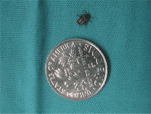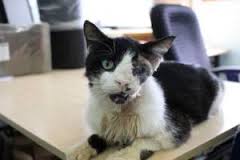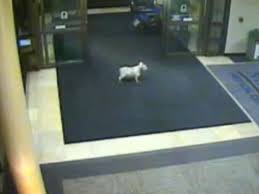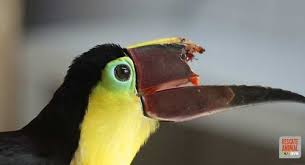Non-Surgical Neutering
Madeline Bernstein, SPCA-LA
 A new cutting-edge technology, originally invented for humans, may change the way we sterilize our pets. Without the risks of anesthesia or changing the way your pet appears, Zeuterin, a promising replacement for the costly neuter surgery, is being used at the SPCA-LA. President Madeline Bernstein is our guest and she explains this technology.
A new cutting-edge technology, originally invented for humans, may change the way we sterilize our pets. Without the risks of anesthesia or changing the way your pet appears, Zeuterin, a promising replacement for the costly neuter surgery, is being used at the SPCA-LA. President Madeline Bernstein is our guest and she explains this technology.
Madeline Bernstein said they began experimenting with Zeuterin last year. They started the training for this new non-surgical procedure to see if they could neuter many dogs quickly and without the dangers of surgery. She said the benefits of Zeutering outweigh neutering for both dogs and their owners.
Zeutering is approximately a 45-minute procedure that requires only sedation. The animal does not need to be "put under" or anesthetized. The non-invasive method combines an innovative procedure with an all-natural product that is injected directly into each testicle under sedation and pain control. There are no sutures or invasive surgery, so the recovery time is quicker. There is no need to leave animals at a center for an extended length of time nor does the procedure need to be done in a specially outfitted mobile unit or clinic. Since there is little to no recovery time required, the procedure can take place almost anywhere, even a parking lot.
Other advantages of Zeutering is that it costs about 1/3 what neutering costs, although some veterinarians are charging double what a normal neuter procedure costs.
 Sometimes surgery can be risky for any animal, especially if they have any unknown conditions. "The idea that you can avoid surgery and just use an injection to sterilize a male dog is wonderful," Bernstein said.
Sometimes surgery can be risky for any animal, especially if they have any unknown conditions. "The idea that you can avoid surgery and just use an injection to sterilize a male dog is wonderful," Bernstein said.
Zeuterin is also great for those people who like the way an "in-tact" male dog looks, as the dog doesn't lose any parts. All dogs that have been Zeutered are tattooed with a "Z." Their owners also receive a certificate of sterilization as well as a tag. Tattooing is not new, with many females being tattooed because you can't tell by looking at them if they have been spayed.
So far there haven't been any side effects from Zeuterin, but perhaps a little swelling. Since Zeuterin is fairly new, there aren't any long-term studies. The question remains that since not all of the testosterone is removed, will the amount of testosterone that's left cause any behavior problems? Another question is that when a surgical neuter removes all of the testosterone, are you opening up the possibility of other diseases that can result? So the final question is that by leaving a little bit of testosterone that Zeuterin does, will it ward of some diseases?
Zeuterin was found to be safe, effective and permanent in FDA clinical trials and is currently approved for dogs only, with the potential to be used on other animals as well.
http://spcala.com
http://www.zeuterin.com
"HERO PEOPLE OF THE WEEK" - Tammy Trujillo - Animal Radio
 This week's Zeuterin Hero is none other than Animal Radio's own team member, Tammy Trujillo.
This week's Zeuterin Hero is none other than Animal Radio's own team member, Tammy Trujillo.
Tammy and her husband Randy do a lot of fostering and are well known where they live for fostering those animals that no one else will tackle or even know how to tackle.
While Tammy cares for a variety of different types of animals, including a blind cat and three-legged dog, what she really specializes in are cats with cerebellar hypoplasia (CH).
Cerebellar hypoplasia (CH) is a condition that starts when a cat is still in the womb. It happens when a pregnant cat ingests a toxin, most commonly anti-freeze which animals are drawn to because of its sweet taste. The toxins then cross the brain barrier of the kittens in utero. This affects the kitten's motor functions.
While they look normal, when they walk, some actually look like they're drunk, while others don't walk at all. Tammy has one of these cats that is 6 years old and has never walked; she actually gets around by pulling herself along. Tammy says she is the happiest cat in the world.
These cats take some extra work and may need help getting to the litter box, but Tammy tells us that people who have experienced CH cats, usually want another one, because they have so much love to give.
Tammy encourages anyone who's thinking about fostering a special needs animal to do it. Yes, it takes more knowledge and time, but it's well worth it! They are just as good as any other animal; they just need a little extra help
Tammy and her husband just won't say no to any animal that needs their help.
Thinking Globally. Acting Locally. Do you know someone that should be nominated for our Hero Person of the Week? Send us an email to: YourVoice@AnimalRadio.com.

Animal Radio's HERO PEOPLE is brought to you by Zeuterin a safe, permanent and virtually painless alternative to surgical castration.
 Ticks Hitchhike on City Dogs Too - Dr. Debbie
Ticks Hitchhike on City Dogs Too - Dr. Debbie
Ticks are common parasites known to infect people, pets and spread disease. Over 850 tick species exist worldwide, although fewer than a dozen species are of risk to pets in the U.S. But here in Las Vegas, pet owners often dismiss the existence of ticks with the likes of Bigfoot or the Loch Ness Monster. Think ticks are only a problem for pets that travel or visit the mountains? Think again.
The Tick Tale
Ticks are parasites known to infect mammals, reptiles and birds and feed on their host's blood. Although of tiny size, ticks ingest 200 to 600 times their weight in a blood meal.
Ticks are attracted to a host's movement, body warmth or exhaled carbon dioxide and then latch on. Through this feeding behavior they can transmit diseases to pets such as Lyme disease, Rocky Mountain spotted fever, Ehrlichia, Babesia and Tularemia. Disease transmission takes some time and may occur after 36 to 48 hours of feeding behavior.
Some ticks can live months or up to a year off its host without a feeding, so year-round prevention is important for pets at risk for continued exposure.
Battling Ticks
There are many topical tick control products available for pets. Speak with your veterinarian for an product that is effective and safe with your pet's individual health in mind. Cats are sensitive to some ingredients, may develop toxicity, and should never be treated with a product labeled only for dogs. Additionally, pet owners using multiple products on their pet should first consult with their veterinarian to ensure safe use of combined products.
In addition to topical tick control, environmental treatment with foggers, sprays or pest control service should be considered for heavy infestations. Limit tick habitat zones by maintaining landscaping, avoiding overgrown grass and keeping shrubs and plants trimmed.
Pet Screening
Perform daily tick checks during tick season. Examine your pet for ticks in areas that the parasites hang out - around the head, behind ears, armpits and between toes.
When removing a tick, avoid handling it directly. Wear gloves or handle with Kleenex since ticks can pass infections to people as well. Grasp the tick with tweezers close to the skin. Extract the tick by pulling straight out of skin. Don't squeeze, twist or leave any legs behind. Disinfect the area and dispose of ticks in rubbing alcohol.
 Here's a photo of a typical tick, born and bred in Las Vegas and recently extracted from one of my Shih Tzu patients named Kane. Kane never leaves the state, doesn't hike in the mountains, and enjoys the comforts of a house-dog lifestyle. A tick was discovered on Kane after a day of supervising his owner's yard work and shrub trimming.
Here's a photo of a typical tick, born and bred in Las Vegas and recently extracted from one of my Shih Tzu patients named Kane. Kane never leaves the state, doesn't hike in the mountains, and enjoys the comforts of a house-dog lifestyle. A tick was discovered on Kane after a day of supervising his owner's yard work and shrub trimming.
Maybe Kane's story will be an eye-opener for city dwelling pet owners. Pet parasites like fleas, ticks and mosquitoes still lurk in that urban jungle.
Visit the Dogs & Ticks website for more information ticks, diseases and prevention.
Featured veterinarian known as "Dr. Debbie" on national pet radio program, Animal Radio. Ebook author of "Yorkshire Terriers: How to Be Your Dog's Best Friend"; "Pugs: How to Be Your Dog's Best Friend"; "Mini Schnauzers: How to Be Your Dog's Best Friend"; and "Shih Tzu: How to Be Your Dog's Best Friend."
http://www.drdebbie
It's a Wacky Wednesday Here at the Animal Radio® Studios
WackyWed Contest IS ON - LIKE your FAVORITE pic and the three pics with the most LIKES & SHARES are this week's winner will receive Diamond Wipes from Divas & Studs.
TO ENTER Send us your FUNNY pet pic to WackyWed@AnimalRadio.com - (Please put WACKYWED in the subject line & give us your pet's name, your name & where you hail from) If YOUR pic is chosen then spread the word to your friends & family on Wednesday - the pics w/the most LIKES and SHARES will be the winner!
 This week we are giving away Diamond Wipes which include the Pet Care Wipe (cleans face and eyes and lifts away try stains); Pet Ear Wipes (swabs away waxy buildup, reduces odor and discomfort); and Dental Finger Mitts (convenient oral care with a fresh peppermint scent) from Divas & Studs.
This week we are giving away Diamond Wipes which include the Pet Care Wipe (cleans face and eyes and lifts away try stains); Pet Ear Wipes (swabs away waxy buildup, reduces odor and discomfort); and Dental Finger Mitts (convenient oral care with a fresh peppermint scent) from Divas & Studs.
Divas & Studs - Safe, gentle & fabulous. Convenient & portable. Pre-treated finger-size cleansing mitts to pamper your pooch. Free of parabens. Made for your highness. We know they've got a big heart and even bigger attitude.

Join Animal Radio® on Facebook for Wacky Wednesday! Win great prizes every week for your wacky pet pictures. Last month we gave out goodies from PetKeeper Secrets, Bergan, Central Garden and more. Visit us on Facebook now.
 Animal Radio® News - Tammy Trujillo
Animal Radio® News - Tammy Trujillo
It's Coyote Mating Season
This is Coyote Mating Season and that means the animals are roaming further than normal and often into neighborhoods. It's enough to prompt a warning about the dangers coyotes pose to cats and small dogs. Coyotes are very smart; they're good at learning people's habits and routines. You should consider changing it up when you let your dog out in the evening and morning hours and you should always go out with your small dogs, especially after dark. Cats should be brought in at night and watch those trash cans and pet food and water dishes because they can attract coyotes to your yard.
 Bart's Story Continues
Bart's Story Continues
The story of Bart, also known as Zombie Cat, continues in Tampa, Florida. Bart's owner, Ellis Hutson, is now suing to get him back. A car reportedly hit Bart and his owner buried him, thinking he was dead. Bart dug his way out and five days later managed to make it to a neighbor's yard before collapsing. Hutson took him to the Humane Society for treatment when he couldn't afford what a vet would have charged. Bart had a broken jaw and a badly damaged eye. The agency says it decided not to return Bart after learning more about the circumstances leading up to his burial; exactly what, they're not saying. The Humane Society says its reviewing legal options. Earlier, the group said Bart would be put up for adoption after he recovers. The agency has received donations from around the world that helped to pay for Bart's care.
 Dog Shows Up At Hospital
Dog Shows Up At Hospital
Never under estimate the love of a dog! A miniature Schnauzer in Cedar Rapids, Iowa went missing recently. Sissy ended up 20 blocks away at the hospital where her guardian, 64-year-old Nancy Franck, had been for two weeks recovering from cancer surgery. Her husband Dale had been taking care of Sissy and another dog at home and just about went crazy when Sissy went missing! He got a call from the hospital a few hours later after a security guard at the hospital found Sissy wandering around the building and called the number on her ID tag. The hospital let Dale take Sissy up to see Nancy for a few minutes when he went to pick the little dog up. How Sissy got all the way to the hospital is anyone's guess, but a surveillance camera in the hospital lobby shows her going through the automatic doors all by herself.
 3-D Printed Prosthetic Beak for Toucan
3-D Printed Prosthetic Beak for Toucan
People from all over the world are pulling for a toucan from the forest of Grecia in Costa Rica and sending money to help him get some amazing high tech help. The toucan has been named Grecia and he lost half of his upper beak during a horrible attack by some young kids. A toucan's beak is not only gorgeous, but they are pretty much helpless without their beaks, not just in eating, but when fighting off predators as well. Pictures of Grecia hit the Internet and an online fund-raising campaign was created to fund the creation of a 3-D printed prosthetic beak for Grecia. Carmen Soto is the vet who is caring for Grecia and says he is recovering and eating, but his wounds still need to heal before what's left of his beak can be scanned to build a model. Nelson Martinez is on the team ready to work on the new beak and says while Grecia heals, they are studying toucan beaks to come up with a workable design.
 Dog Manages After Losing Tongue
Dog Manages After Losing Tongue
A 7-year-old yellow Lab named Doc lost his tongue a few weeks ago and Vanessa Meyer and her husband Brad will likely have to hand feed him for the rest of his life. What happened can only be called a freak accident. Doc apparently got his tongue stuck in his kennel between the boards where the top of the kennel met the walls. His vet says Doc must have panicked and backed up with all his might, pulling the muscles completely out. As horrible as it sounds, Doc was still wagging his tail after the injury. He's doing even better now, learning to slurp water from a full five-gallon bucket similar to the way a horse drinks. Dogs also use their tongues to wash and to pant to cool themselves down and the Meyers say they will find a way to help him do those things down the road. They're committed to making sure Doc has a full life. Meyer has created a Facebook page where she is documenting Doc's recovery. She's also getting tips from the guardian of another dog living without a tongue, a French Mastiff named Hooch in California.
Rio's Carnival Pet Parade
Rio de Janeiro's Carnival has been called the greatest party on Earth, and it's not just for people anymore. This year's Annual Rio pet parade on Copacabana Beach featured more than 100 canines and their handlers. It's one of more than 500 street parties leading up to Carnival. This year's dogs came as everything from superheroes to a ladybug, bumblebees and circus clowns.

NEWS UPDATE brought to you by Drs. Foster & Smith, affordable pet supplies. Low prices every day, so you save on every order.
 Listen to the entire Podcast of this show (#795)
Listen to the entire Podcast of this show (#795)





